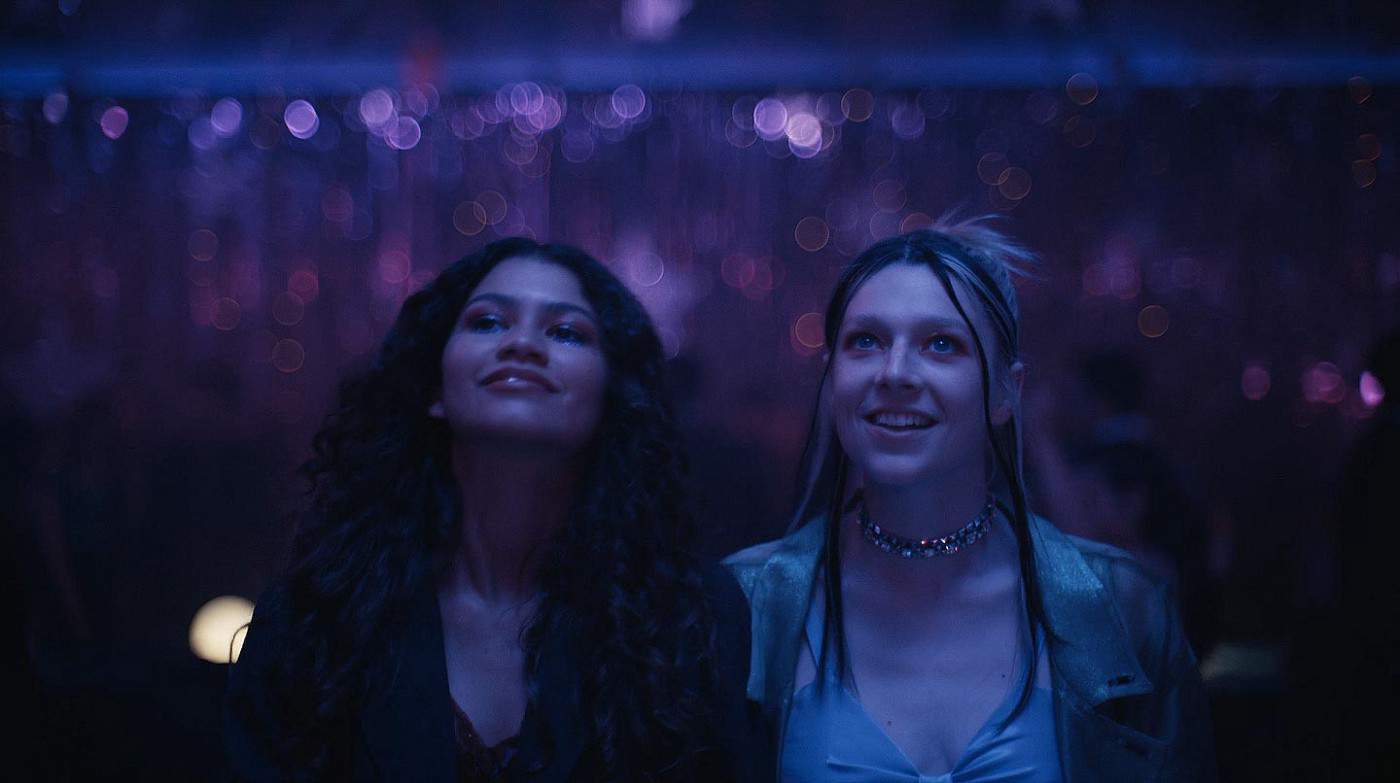The HBO show Euphoria follows various high school students in their struggles with drugs, sex, and violence. The main character, Rue Bennett (Zendaya), is a drug addict trying to work a recovery program with her sponsor Ali Muhammed (Colman Domingo).
In the first season and part of the second, each episode devotes its first 10 minutes or so to introducing a different character’s backstory. Rue’s introduction starts by establishing the social context of her generation. In her opening monologue, we see her as a fetus inside her mother’s womb with the voiceover:
“I was once happy. Content. Sloshing around in my own private, primordial pool. Then one day, for reasons beyond my control, I was repeatedly crushed, over and over, by the cruel cervix of my mother.”
Her first words already signal a worldview: Happiness is found in isolation while the outside world is oppressive. She continues, “I was born three days after 9/11 […] my mother and father spent two days in the hospital, holding me under the soft glow of the television, watching those towers fall over, and over, and over again, until the feelings of grief and the chills of horror gave way to numbness.” For Rue, her post-9/11 generation lives in a threatening world marked by pain and indifference.
As a television show, Euphoria is very graphic, but with a purpose. The characters cope with the heartless world by engaging in all kinds of addictive behaviors (alcohol, drugs, sex, and codependency). Addiction appears in Euphoria as a symptom of our modern culture. For the show, a side-effect of modernity has been an increase in isolation and objectification. These “malaises of modernity” have been analyzed in a more sociological way by the Canadian philosopher Charles Taylor. According to him, the scientific revolution, the rise of liberal democracy, the industrial revolution, and the decline of religion within the public sphere have all contributed to much progress in terms of personal freedom and the recognition of diverse identities. But compared with pre-modern times, the downside has been the erosion of communal ties and the loss of cosmic meaning. In our society, personal authenticity is oftentimes pursued in opposition to traditional forms of communal identity.
The characters in Euphoria seek in the margins their own authenticity. Yet, if they do so, it is because their immediate community has failed them. When Jules (Hunter Schafer) was 11 years old, her mother, also a drug addict, had her committed to a psychiatric hospital to treat her gender dysphoria. Nate’s (Jacob Elordi) toxic masculinity comes from when he discovered, as a child, that his father was living a double life outside of his family. Cassie (Sydney Sweeney) was sexually objectified as a girl, leading her to seek recognition in harmful romantic relationships. All these characters were born into a world in which communal ties were already broken or non-existent. Unmoored, they seek solace in their own individuality.
In a special episode focusing on a conversation between Jules and her therapist, she says, “At least for me, being trans is spiritual […] it’s not religious. It’s not […] for some congregation. It’s for me.” Jules describes the construction of her identity in individualist terms. This fits well with the typically modern “spiritual, but not religious” mentality. Now, this spiritual expression presupposes an opposition between the individual and the community. Most of the Euphoria characters behave as such in reaction to social expectations. This ambivalent reactivity is a feature of modern life. On the one hand, individuals in modernity are encouraged to express themselves uniquely, but, on the other hand, the lack of transcendence and of overarching meaning provided by that self-expression leaves them feeling empty and adrift.
Addiction, in Euphoria, illustrates Taylor’s malaises of modernity. These addictive behaviors stem from a desire to escape an objectifying world, but this escape breeds more isolation and loss of freedom. In light of this, Rue’s drug addiction is a desperate attempt at re-enchanting a disenchanted universe. “We’re living in dark times. Not a lot of hope out there,” Rue’s sponsor, Ali, says to her at one point. “The thing I miss about doing drugs,” he continues, “is the beauty.” Yet, this beauty proves to be illusory.
Rue’s special episode takes place in a diner on Christmas Eve where Rue and Ali talk about addiction, love, grief, and spirituality. In their conversation, Rue shares with Ali her difficulties in accepting a Higher Power as part of her recovery. She teases that maybe devoting herself to some social cause might give her life meaning. To this Ali responds with a monologue about the superficiality of social activism when it is commercialized. This leads him to say: “A true revolution […] is at its core, spiritual. It is a complete decimation of one’s priorities, beliefs, and way of living […] It is imperative that you believe in something. Something greater than yourself […] Because everything else in your life will fail you. Including yourself.”
Ali is basically saying to Rue: “You must change your life” (to echo the words of the Austrian poet Rainer Maria Rilke). A life lived in all its reactive immediacy is not all there is. A change must take place through surrender, not self-will. As addicts, the characters in Euphoria are obsessed with control, and here lies their self-deception. Rue wants to control her drug use; Nate wants to control the women he’s involved with; Jules, Cassie, Maddy (Alexa Demie), and Kat (Barbie Ferreira) want to control how others perceive them. Yet, the more control these characters seek, the less they have. Ali’s message is that Rue’s attempts at balanced drug use are bound to fail because drugs will always end up controlling her. To change, she needs to open up to what’s beyond her and accept the help offered to her.
By the end of the second season, Rue gets to see herself from the eyes of her best friend Lexi (Maude Apatow). Throughout the season, Lexi writes a high-school play based on her friends. At its premiere, many of them resent seeing themselves in it. Not Rue who welcomes having this mirror held up to her. This spiritual experience made her aware of all the people she had harmed. The season concludes with Rue expressing contrition to her family and friends. “The thought of maybe being a good person,” says Rue in her closing voice-over, “is what keeps me trying to be a good person.” After seeing a version of her life on stage, Rue seems to realize that her life can still be written in another more hopeful way.
Euphoria presents us with a culture that oftentimes leaves its young ones to search for transcendence in the wrong places. A century before Charles Taylor, the Jesuit poet Gerard Manley Hopkins expressed a similar, yet more succinct and poetical depiction of modern society: “all is seared with trade; bleared, smeared with toil; / And wears man’s smudge and shares man’s smell: the soil / Is bare now, nor can foot feel, being shod.” Today we would say that everything is commercialized and polluted. For Hopkins, the way out of this “immanent frame,” to use Taylor’s expression, is to recognize that “the world is charged with God’s grandeur.” Rue and the other characters are looking for a world charged with euphoria, yet, as sensation alone, euphoria is fleeting and without transcendence.
-//-
Watch Euphoria on HBO Max. Image courtesy of Warner Bros. Television.


